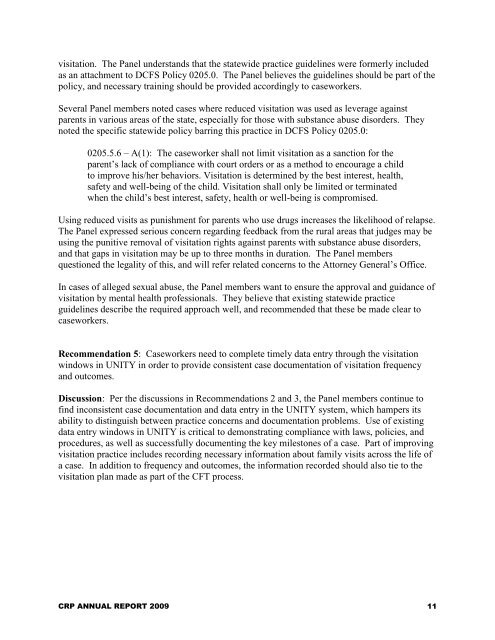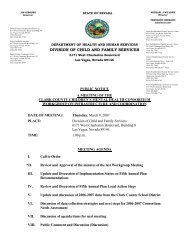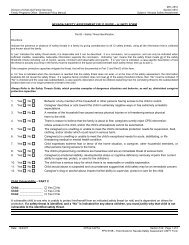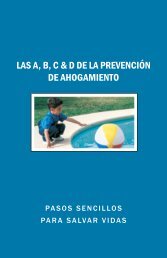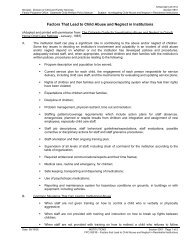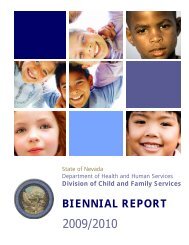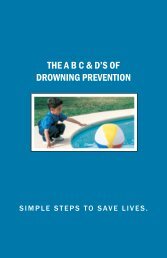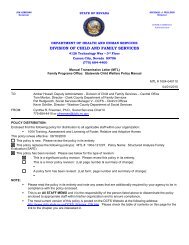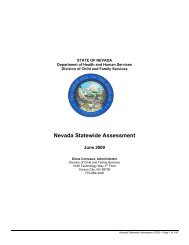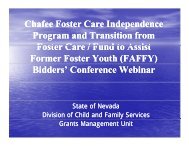STATE OF NEVADA - Division of Child and Family Services
STATE OF NEVADA - Division of Child and Family Services
STATE OF NEVADA - Division of Child and Family Services
Create successful ePaper yourself
Turn your PDF publications into a flip-book with our unique Google optimized e-Paper software.
visitation. The Panel underst<strong>and</strong>s that the statewide practice guidelines were formerly included<br />
as an attachment to DCFS Policy 0205.0. The Panel believes the guidelines should be part <strong>of</strong> the<br />
policy, <strong>and</strong> necessary training should be provided accordingly to caseworkers.<br />
Several Panel members noted cases where reduced visitation was used as leverage against<br />
parents in various areas <strong>of</strong> the state, especially for those with substance abuse disorders. They<br />
noted the specific statewide policy barring this practice in DCFS Policy 0205.0:<br />
0205.5.6 – A(1): The caseworker shall not limit visitation as a sanction for the<br />
parent’s lack <strong>of</strong> compliance with court orders or as a method to encourage a child<br />
to improve his/her behaviors. Visitation is determined by the best interest, health,<br />
safety <strong>and</strong> well-being <strong>of</strong> the child. Visitation shall only be limited or terminated<br />
when the child’s best interest, safety, health or well-being is compromised.<br />
Using reduced visits as punishment for parents who use drugs increases the likelihood <strong>of</strong> relapse.<br />
The Panel expressed serious concern regarding feedback from the rural areas that judges may be<br />
using the punitive removal <strong>of</strong> visitation rights against parents with substance abuse disorders,<br />
<strong>and</strong> that gaps in visitation may be up to three months in duration. The Panel members<br />
questioned the legality <strong>of</strong> this, <strong>and</strong> will refer related concerns to the Attorney General’s Office.<br />
In cases <strong>of</strong> alleged sexual abuse, the Panel members want to ensure the approval <strong>and</strong> guidance <strong>of</strong><br />
visitation by mental health pr<strong>of</strong>essionals. They believe that existing statewide practice<br />
guidelines describe the required approach well, <strong>and</strong> recommended that these be made clear to<br />
caseworkers.<br />
Recommendation 5: Caseworkers need to complete timely data entry through the visitation<br />
windows in UNITY in order to provide consistent case documentation <strong>of</strong> visitation frequency<br />
<strong>and</strong> outcomes.<br />
Discussion: Per the discussions in Recommendations 2 <strong>and</strong> 3, the Panel members continue to<br />
find inconsistent case documentation <strong>and</strong> data entry in the UNITY system, which hampers its<br />
ability to distinguish between practice concerns <strong>and</strong> documentation problems. Use <strong>of</strong> existing<br />
data entry windows in UNITY is critical to demonstrating compliance with laws, policies, <strong>and</strong><br />
procedures, as well as successfully documenting the key milestones <strong>of</strong> a case. Part <strong>of</strong> improving<br />
visitation practice includes recording necessary information about family visits across the life <strong>of</strong><br />
a case. In addition to frequency <strong>and</strong> outcomes, the information recorded should also tie to the<br />
visitation plan made as part <strong>of</strong> the CFT process.<br />
CRP ANNUAL REPORT 2009 11


